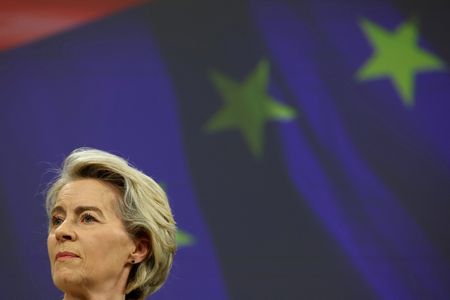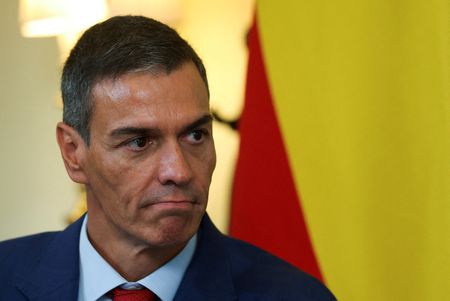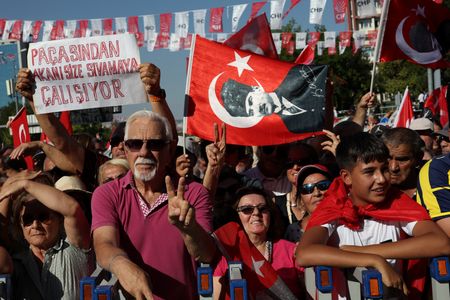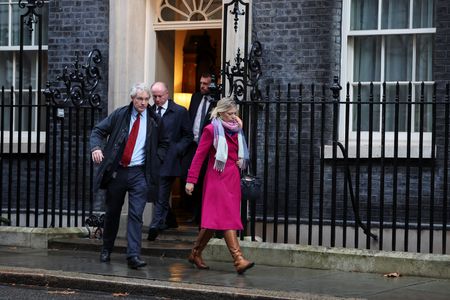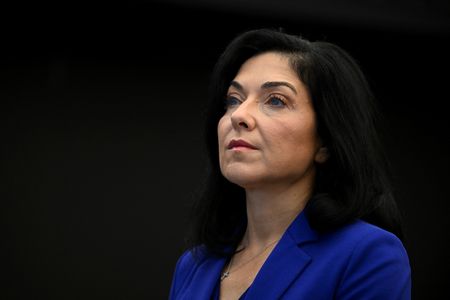By Jan Strupczewski
BRUSSELS (Reuters) -The next European Union budget, paying for EU policies in 2028-2034, must be more flexible, more focused and funded by new revenues to repay the joint EU borrowing for the pandemic fund, the head of the European Commission Ursula von der Leyen said.
Her remarks kick off the toughest and most acrimonious debate in the 27-nation EU, that pits Europe’s rich net budget contributors against poorer net beneficiaries and traditional sectors like agriculture against the needs to develop cutting-edge new technologies.
Speaking at a budget conference, Ursula von der Leyen said the bloc will have to rethink the way it constructs its budget, worth just above 1% of the EU’s GDP, to adapt to the dramatic changes in the world in recent years.
Von der Leyen pointed to rising geopolitical tensions, the global trade war, extreme weather events caused by climate change and the technological revolution triggered by artificial intelligence as setting new challenges for the EU budget.
“The new normal is anything but normal,” she said.
While underlining the importance of EU budget support for farmers and EU regions which now jointly get two-thirds of EU cash, von der Leyen also stressed the need for EU money to fund EU priorities that shift with global changes.
She noted that in the current, 2021-2027 EU budget, 90% of its total 1.2 trillion euros was already rigidly assigned when the budget was negotiated in 2019 and 2020. The next budget will have to be much more flexible, she said.
“Think about new technologies like Artificial Intelligence (AI). When the current budget was negotiated, we thought AI would only approach human reasoning around 2050. Now we expect this to happen already next year,” she said.
“Our budget of tomorrow will need to respond fast. Think about natural disasters like storms, flooding and heat waves. No one can predict where or when the next one will hit,” she said.
FOCUSED, SIMPLER AND BIGGER
She said the next budget will have to be more focused because the limited amount of money was now spread too thinly over too many projects and stressed local authorities must be involved in designing what to spend EU money on.
“The new budget …will be centred on national and regional partnerships for investments and reforms. These partnerships will be shaped by European priorities,” she said.
Rather than reimbursing some of the national spending once an agreed project is completed, the new EU budget is to draw on the experience of the EU’s pandemic fund, created in 2021 to help the EU economy recover after the COVID-19 pandemic, which linked disbursements to achieving milestones and targets.
“Each tranche of funding will be disbursed when agreed objectives have been achieved. Because this is the strongest incentive to get things done,” von der Leyen said, adding the next budget must also have easier procedures to apply for funds.
The next EU budget will also have to start gradually repaying the 338 billion euros ($380 billion)of grants that are to be disbursed to EU governments by the pandemic fund. The money should be paid back in full by 2058.
The Commission estimates that the repayments will slash 20% off the already strained EU annual budget, making it impossible to fund even the current policies, without any new ones.
“We need new sources of financing. We must finance new priorities, and we must start repaying the loans raised for NextGenerationEU. It is clear that national budgets alone cannot bear the brunt of it. So we need new own resources,” von der Leyen said.
($1 = 0.8887 euros)
(Reporting by Jan StrupczewskiEditing by Alexandra Hudson)

